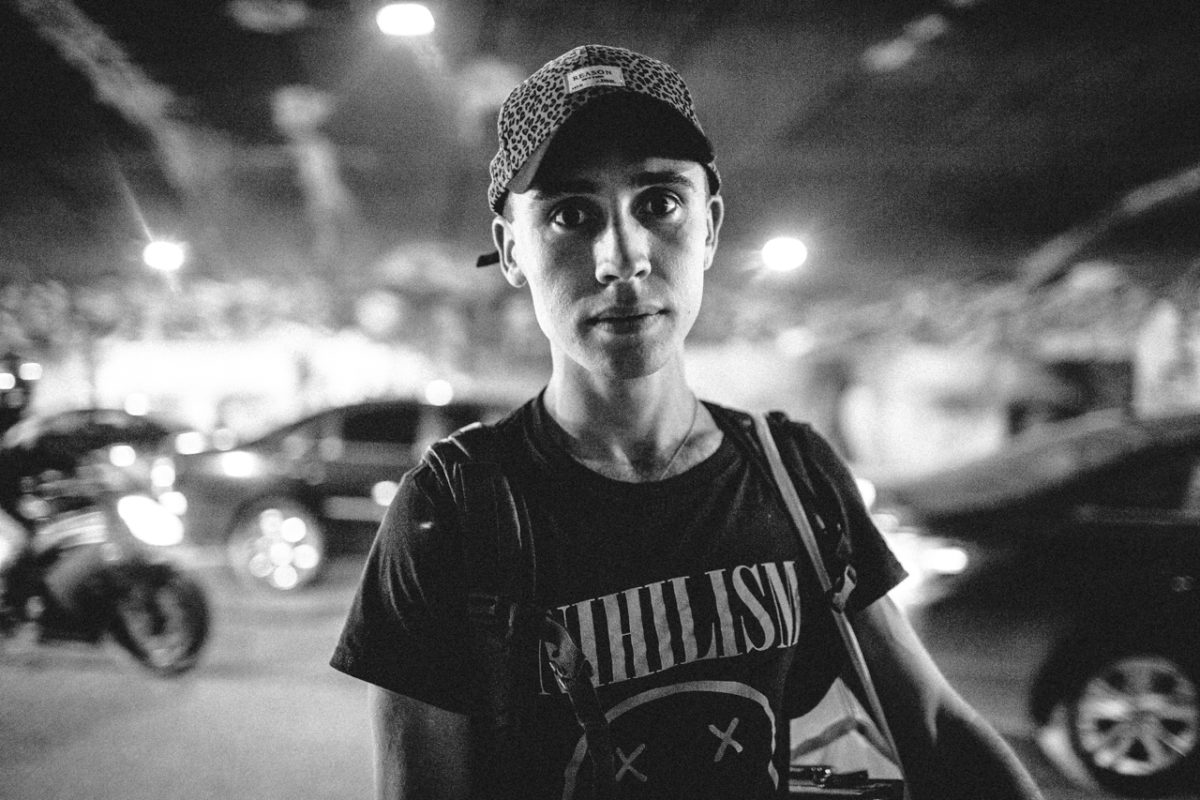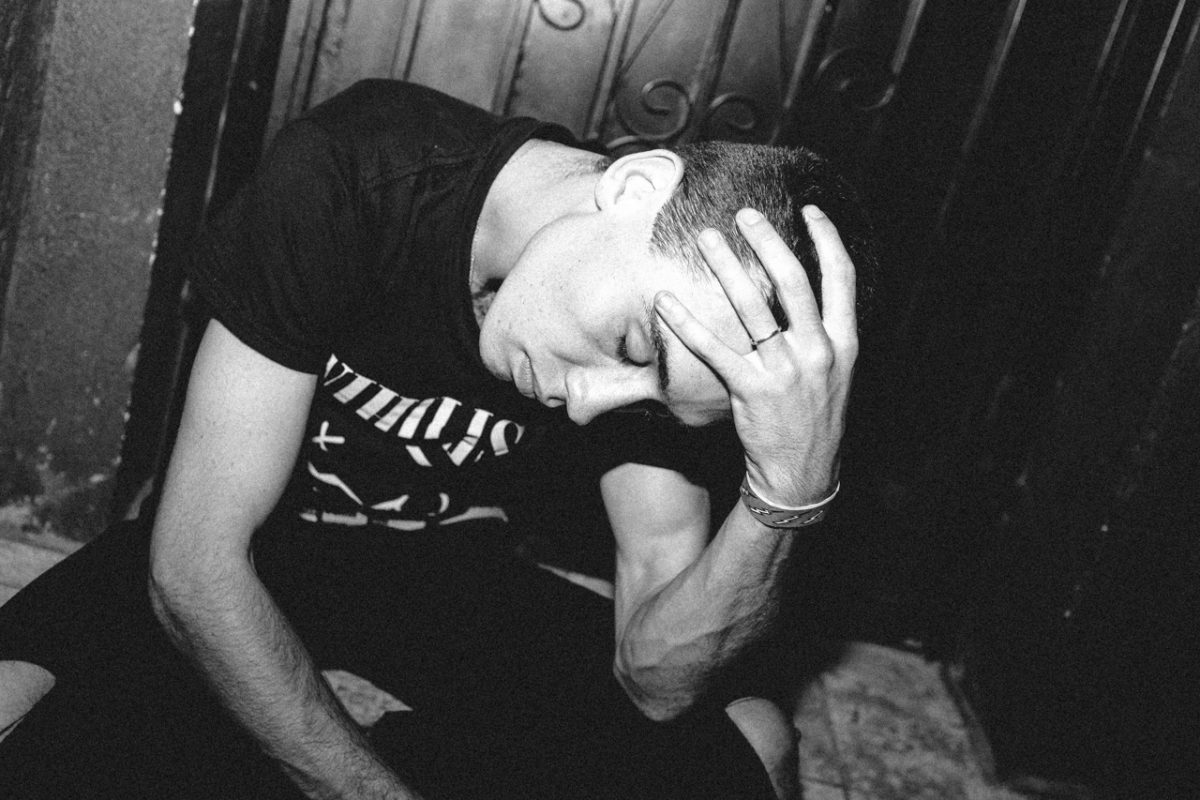The Everyday Magic of T.O.L.D.

Your moniker is inspired by Klimt's Death and Life. You had a van packed up, were driving west and came across the artwork. Where were you going and what sparked the sudden change?
I'd been living in London, just sharing a music project, kind of all-in, and eventually it came to the point where I was a broken man. I was moving back in with my dad basically to just rest for a bit and figure out what was next so that was kind of like a bit of a bottom I guess. It was kind of like I was in some way, in a deeper level, looking everywhere else for answers.
Let's talk about the title, It's Not About The Witches. What is your history with witchcraft and magic? Are there any particular stories in that realm that have stuck with you?
I guess I've always seen life as a magical act. Also, the practice of witchcraft–I feel like we do that every day with our words. Without being a liar, my only experience of that is through doing things and seeing the results. That's as simple as it is.
What kind of results?
I'm talking real life, kind of right there in front of you results. Nothing mystical, nothing strange. Well, sometimes strange. But I'm talking like, are you being creative? Are you being loving to other people? Are you being a force of good in the world, essentially? That's what I'm really trying to get to.
I also want to touch on Prometheus Rising a little bit, which served as a main source of inspiration behind the record. What's one of the lessons from that that you continue to find yourself going back to?
I'd probably say his adaptation of Timothy Leary's Eight-Circuit Model of the Human Mind. So imagining the human mind as a computer with eight circuits and the first circuit being the baby, just basically needing food and a shelter and the basic needs and it goes up from there. Here's how the adaptation using that in a practical way to deal with your own life is totally revolutionary in my own life.
What is your environment like, maybe before you moved to Los Angeles and since here? Has L.A. had an effect on the way that you produce work?
Definitely. I don't know why but I'm really affected by the weather. Living in England, it was really hard to break out of the gloom. It's always like I can only say it right when in a space and it feels open and the sky is blue, so moving to California was a really good idea for me at that time. It opened me up.
What was your approach to creating the record? Did you go in with a complete direction in mind or did it shape up piece by piece?
This album in particular I've been writing for five years. I kind of had in mind what it was that I wanted to say. I started arranging things, I started just opening my mind to those pieces that would fit this album, and then after I had everything all lined up and planned, that's when the deconstruction began. A lot of the work of the album was deconstructing it and building it back up and exploring what kind of journeys you could take.
What kind of personal challenge did you have to push through when making the album?
Patience is a huge one. The one I'm going through right now. This album's like a lot of coming away from that way of looking at the world. It demanded me to just sit for hours and hours and consider and ponder and just go deep, just like do it. It was like a magical, like when you talk about witchcraft and magic, that was my practice basically. Using it as a vehicle for discovery, self-discovery.
How did you find and involved the gospel choir on the album? What is your relationship like with one another?
Oh my god! They were fucking amazing to work with. Like, it was the easiest part of the whole record. So how that happened: I was tracking with Tom Biller when we first started recording the album, recording all the drums and stuff, and I just said to Tom, kind of as a half-joke, "We need a gospel choir, dude." I said it many times before and people thought I was joking and laughed so I didn't know in what tone to say it. Then a few months later Tom was like, "Dude, I found the gospel choir," just out of nowhere. And like, holy shit. We got a studio in Hollywood, it was the room Prince did "Purple Rain" in so there was already magic there when I walked in and then the process of recording was just so easy. They just did it. They just listened to the songs, they read the lyrics, and they went and they were there instantly. It was incredible to watch. And I want to work with them many, many, many times in the future. They're like my favorite people to work with.
I oftentimes find music can be a very transcendent, almost religious-like experience. In "Return Forever" you said "no religion can be mine," but do you have any bond with any kind of spirituality?
Yeah, totally. I went to a Christian school when I was five and started getting indoctrinated into that but I quickly realized that it was not the truth of things. I mean, if you even know, it's so outdated and, you know, I was growing up in the 90s. I was like, fuck that. I knew I had to find my own way 'cause I knew there was something that wasn't being told to me, something that we didn't know and let's uncover the mystery. That was my mode at the time. I guess a more rational approach was [that it would] bring out more answers really.
What was your relationship with producer Tom Biller [Warpaint, Kate Nash] like in the studio?
Tom was like my mentor. I went to him, I was newly sober. I didn't really know why I was doing my day to day function of being a human. I was kind of a bit of a mess but I had all this music that I needed to record. That was my past. And he welcomed the whole thing in and just gave it all space. A lot of the days we sat, just listening and just considering. He allowed it to grow in such a beautiful way. I said it before but he's a gardener. He has all of these vegetable gardens in his place. That's what he does, he just nurtures things in a beautiful way and I felt like I was being nurtured when I was working with him.
I want to go back to your early days. I saw that you had Be Here Now by Ram Dass in your house as a child, calling it a hippie bible. What was your home life like growing up?
My home life was pretty cool. I grew up in a small town in England called Malvern which was like this kind of countryside town on the hills. It's the hills where there's this rumor that J.R.R. Tolkien originally conceived the idea of the Shire in The Hobbit. C.S. Lewis used to walk the Malvern hills and that's what he based Narnia on so it's a really beautiful place. I didn't realize it was such a beautiful place until I moved to London, until I really got out and saw the rest of the world, but now I want to go back there. It's so fucking cool.
I also read that you walked out of school after a math class incident. What are your thoughts on the linear pathway we're expected to take versus paving your own road?
I think it's important to remember this idea that we're all individuals. That's a brand new idea. It was after the rise of fascism and [such], this stuff started to come out and people actually started to live their lives in this individualistic way. It's like a big experiment. We don't know what we're doing. That's the way I see it. I feel like more thought needs to go into that. I know it wasn't the right way for me, I know I needed to just feel it out basically because I become a bad person when I'm put in a box. I'm not happy and when I'm not happy... when people aren't happy they don't value things in the same way and so they start to act in ways that look like them being a bad person but it's actually just them hurting. It's all in there. It's a grand experiment.
I think the problem is people say this is the path you have to go somewhere but none of us know. We just kind of try things out, see if this works, that fucked up, let me go this way... Alright, that didn't work either. Now what?
I think the biggest problem we all have is believing in things too much. We don't need to believe in everything at all really. All of these ideas are just ideas. They aren't right there in front of you. They are abstractions. Like, stay with it. Don't get lost in those beliefs. That's when people get hurt.
A good thing to keep in mind. Do you have any rituals or routines you do before going on stage or into the studio to write?
I do like Pranayama breathing and some meditation. I haven't always done it, it's quite a new thing for me since I've started doing the album. I just needed to find ways to be able to instantly tap into myself but yeah I recommend Pranayama. It's like a series of techniques, like really specific techniques that you can use. You can google it, it's really easy to find.
You've also mentioned turning T.O.L.D. into something past the musical sphere, perhaps with technology involved. Is there anything we can look forward to or ideas you're itching to have the opportunity to play with?
I have a vision of a future where art collectives are more of a thing, like a sustainable way of life. Where people can be creating art and sharing ideas and exploring ways of making a sustainable planet. We're at that point now. I think art is the way. The oddest thing to be saying it right, like bad politicians are, so I think I want T.O.L.D. to come up with the next wave of art as a new way of life. I don't know how it's going to be done but that's how I envision it happening.
T.O.L.D. came from a place of being unhappy, but you're happy now. Why is that?
Because we go up and we go down. I think like being happy is having the perspective to see that you are okay. The reason that I am like that right now is probably because I haven't drank for two years, I do a lot of Pranayama breathing, I meditate a lot. I'm working for it. It's something you've got to work for.







